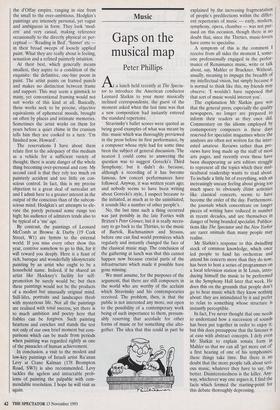Music
Gaps on the musical map
Peter Phillips
At a lunch held recently at The Specta- tor to introduce the American conductor Leonard Slatkin to your more musically inclined correspondents, the guest of the moment asked when the last time was that a new composition had instantly entered the standard repertoire.
Stravinsky's ballet scores were quoted as being good examples of what was meant by this: music which was thoroughly previewed in the press before its first performance, by a composer whose style had for some time been the subject of general discussion. The nearest I could come to answering the question was to suggest Gorecki's Third Symphony; but it didn't do because, although a recording of it has become famous, few concert performances have followed. Anyway, it was written years ago; and nobody seems to have been writing about Gorecki's style, I suspect because to the initiated, as much as to the uninitiated, it sounds like a number of other people's.
No, the last time such a thing occurred was just possibly in the late Forties with Britten's Peter Grimes; but it is really neces- sary to go back to the Thirties, to the music of Bartok, Rachmaninov and Strauss, before one can find world premieres which regularly and instantly changed the face of the classical music map. The conclusion of the gathering at lunch was that this cannot happen now because crucial parts of the infrastructure which made it possible have gone missing.
We must assume, for the purposes of the argument, that there are still composers in the world who are worthy of the acclaim which Stravinsky and his contemporaries received. The problem, then, is that the public is not interested any more, not open to the possibility of a contemporary work being of such importance to them, presum- ably reserving that accolade for other forms of music or for something else alto- gether. The idea that this could in part be explained by the increasing fragmentation of people's predilections within the differ- ent repertories of music — early, modern, symphony, opera, chamber — was not pur- sued on this occasion, though there is no doubt that, since the Thirties, music-lovers have come to specialise. A symptom of this is the comment I receive from all sides the moment I, some- one professionally engaged in the perfor- mance of Renaissance music, write or talk about, say, Mahler or Bruckner. Without, usually, meaning to impugn the breadth of my intellectual vision, but simply because it is normal to think like this, my friends may observe: wouldn't have supposed that that sort of music would interest you'.
The explanation Mr Slatkin gave was that the general press, especially the quality newspapers, no longer are prepared to inform their readers as they once did. Commentary on the idioms employed by contemporary composers is these days reserved for specialist magazines where the analyses are often not written for the inter- ested amateur. Reviews rather than pre- views have long made up the stuff of most arts pages, and recently even these have been disappearing as arts editors struggle to represent all the topics which their mul- ticultural readership wants to read about. To include a little bit of everything, with an increasingly uneasy feeling about giving too much space to obviously elitist activities like classical concerts, seems to have become the order of the day. Furthermore, the journals which concentrate on longer pieces of writing have reduced in number in recent decades, and are themselves in danger of being branded specialist. Publica- tions like The Spectator and the New Yorker are rarer animals than many people may realise.
Mr Slatkin's response to this dwindling stock of common knowledge, which once led people to fund his orchestras and attend his concerts more than they do now, has been to host a series of programmes on a local television station in St Louis, intro- ducing himself the music to be performed in the Symphony Hall later that week. He does this on the grounds that people don't go to hear music which they know nothing about: they are intimidated by it and prefer to relax to something whose structure is instantly perceptible.
In fact, I've never thought that one needs to understand how a succession of sounds has been put together in order to enjoy it but this does presuppose that the listener is at ease with abstract concepts. I defy even Mr Slatkin to explain sonata form in Mahler so that we can all 'get more out of a first hearing of one of his symphonies; these things take time. But there is no doubt that the more people talk about seri- ous music, whatever they have to say, the better. Disinterestedness is the killer. Any- way, whichever way one argues it, I find the facts which formed the starting-point for this debate thoroughly depressing.


























































 Previous page
Previous page